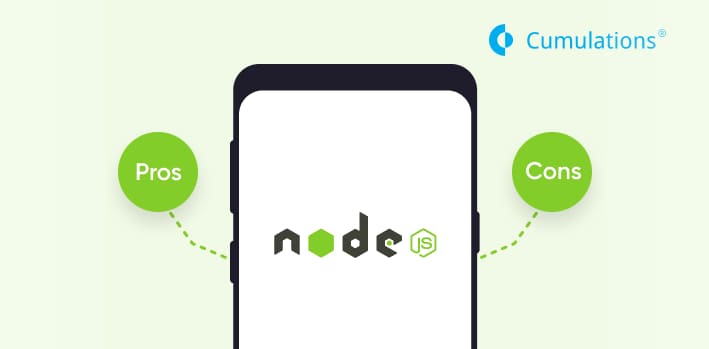
There is no uncertainty that Javascript, precisely Node.js Web application being considered one of the most popular and widely used server-side programming languages and commonly used front-end web development tool. In addition to this, it has gained its reputation due to its usage in various other popular platforms including React Native, PhoneGap, Titanium, Apache, NativeScript, Appcelerator and some others as well.
Moreover, in the actual state, the numerous applications for JavaScript has prolonged and now it is being effectively used for server-side programming. Node. js has played a key role in the acceptance and popularity of JavaScript. The popularity of Node.js, based on Google’s V8 JavaScript engine can be credited to the speed and efficiency it provides the development environment.
What is Node.js?
Most People think Node.js Web application is a framework that is pretty identical to Javascript but in reality, Node.js is a Javascript run-time environment that helps in running JavaScript code on the server-end. This is an open-source platform as well which increases flexibility to getting things done. Certainly, there cannot be one remedy for multiple problems but using one programming language for various code segments makes testing and maintenance easier. Node.js being implemented in software development projects because of multiple benefits.
There is a rise in demand for the server programming ability, and in such a scenario, the popular JavaScript framework is the Node.js. Using Node.js for servers is meaningful, all code is built with the same principles in mind. Talking more, it was originally written in 2009 but at that time it dIdn’t get that much of popularity as people didn’t have much knowledge regarding the same. In recent times, it is being used by the top App Development Companies at the back end.
Must read: Node js vs Python: which one you should choose for your project?
To find more you need to understand its negative and positive impact before making any choice! Therefore, here we are suggesting the positive and negative impact of choosing Node.js web app development which you may consider for developing your applications. Because any wrong decision can cost you more money. So, let’s take a look over these mentioned points
Pros of Node.js
1. Easy to Learn
JavaScript is most extensively recognized and accepted programming languages among developers, almost all of the front-end developers have a good grip over it. For them, to implement Node.JS as a back end as it is really easy to learn and accordingly becomes much easier to use and make effective use of it.
2. Node.js offers an Easy Scalability
Node.js Web application is a light technology and one of the primary key advantages of using Node.js is that it is considered to be the best choice for micro-service architecture. Web Developers find it fairly easy to scale the applications in horizontal and vertical directions. It becomes simpler to increase more micro-services on the top of the existing one. It is extremely scalable and provides a higher possibility than alternative JavaScript servers.
3. Node.js is used as a Single Programming Language
Node.js web application supports JavaScript and permits developers to implement their favourite programming language on both front-end and back-end to build the best web applications. This means Node.js web application requires less code related to other languages for front-end and back-end. Also, Node.js supports reusability of code amongst front-end and back-end which can speed up the development process. Hence, the Web App Development company can avoid hiring the distinct developers for the back end as well as front-end and can cut-off much of the overhead cost.
4. The benefit of Full Stack JS
Node.js is best-known as full-stack JavaScript as it serves both client and server-side applications. Earlier, companies used to employ separate developers for frontend and backend, as at that time Javascript was only and majorly used programming language for server-side programming. However, talking about the current situation Node.js with Javascript has become one of the critical and important functions which has to be used for the back end and front end web application development as it makes it simpler for the app development.
5. The Support of Large and Active Community
Node.js has a large and energetic community of developers who are contributing to its further development and enhancements. The community which includes Node.js developers have the most competent and active group of developers who work on the development of Node.js. Node.JS Developers community is very dynamic and constantly contributes to the improvement and bring betterment of Node.js, with the cooperation and contribution of Javascript programmers, multiple ready-made solutions and numerous possibilities. While it is the primary stage of development for the Node.js run time environment as its development community members are dynamically extending themself and they are going multiple miles for its users to provide them with the best solutions.
6. The facility of Caching Single Modules
Caching is a process to improve on the performance of an application, be it a desktop, mobile or web. The open-source run environment of Node.js supports caching of individual modules. The request from the first module gets cached in the application memory, allowing applications to load the web page faster and respond very smoothly to the end-users. This makes it easy for the developers to not to do the re-executing the codes as it allows the web pages to respond faster and swiftly.
7. Facilitates real-time application development
Node.js is generally used by JavaScript developers for developing real-time and multi-user applications like chat apps, games and headless browsers like chatbots, voice user interface applications like Alexa and so on. Node.js gives you much more space and liberty in doing the job your way, but you have to build everything from scratch. It can carry out primary tasks, but gives you only the bare minimum from a fresh install, making it less restricted.
Cons of Node.js
1. Application Programming Interface (API) is Not Stable
One of the major problems that most of the developer’s face is its Application Programming Interface (API) , the lack of stability that keeps on changing at definite intervals and does not remain stable. The changes are often backwards-incompatible. When developers face such a situation, programmers are forced to update and make changes to the existing code base to make it compatible with the latest version of the Node.js API.
2. Doesn’t have a standard library
With different programming languages JavaScript does not have a robust library system. Hence, the users have to take the support of commonly provided libraries for implementing diverse undertakings such as Object-Relational Mapping (ORM), processing of the images, handling database activities and XML parsing and so on. Hence, this makes it difficult for developers to implement common programming tasks using Node.js.
3. Requires More Time to Get Developed
Node.js have a lot of options, it is seen as a drawback by some of the developers. Programming language Ruby on Rails renders developers with guidance and guidelines and helps the way of doing things, but with Node.js, one needs to build everything from scratch. This may affect the productivity and may cause a delay in the completion of your application or project. However, if you have good experienced and collaborative programmers who have developed a good process for maintaining and developing code, you may not need to worry about their efficiency.
Conclusion
Even with the shortcomings, Node.js proposes a good number of features to write a variety of server-side and networking applications and real-time Web APIs in JavaScript. Today, most of the business organizations look for Node.js to generate positive results. Node.js uses JavaScript, which makes it a robust system for back-end development because developers are acquainted and cosy with it. Also, more enterprises are using Node.js, and that itself makes it a great system for back-end programmers to use.
Also Read: Top 10 Node js Frameworks for Web & Mobile App Development


 +91-984-5825982 | +91-996-4689921
+91-984-5825982 | +91-996-4689921 sales@cumulations.com
sales@cumulations.com Send your requirement
Send your requirement 



